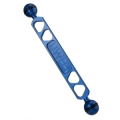Canister Lights
Canister Lights There are many different types of lighting systems available on the Market today. Canister lights are just one of many. Canister lights have been embraced by technical divers, caver divers and wreck divers. John’s Quick Tips: Canister Light Differences Light Bulbs: LED or HID There are three main types of lights made today. All have their merits. LED Lights are the latest and greatest lights available. LED have a higher Kelvin temperature than halogen lights. The higher Kelvin makes for a whiter color light. LED’s are unbreakable but they can still get hot if the manufacturer runs them at a higher percentage of output. All in all this is the choice for most divers. HID lights are available in many different options. HID is still the choice of videographers. The HID has a deeper penetration. Your average diver will never need this deeper penetration of light. Cave divers are still using the HID heavily but we believe that will soon be changing to LED. The only gripe of HID is that you have to be more careful with the bulbs. The bulbs are expensive on these lights. They never burn out but if you smack them hard you can break the bulb. Battery Packs: Lead Gel, NIMH or LION Lead Gel Cells used to be common in diving. There are still lights that use them but most of the lights are now going to other rechargeable batteries. Lead Gells Cells are affordable and do not have memory issues. What this means is that you can recharge them at any time without fear of ruining the batteries life. NIMH batteries or Nickel Metal Hydride are one of the most commonly used battery packs now available. They have a long life and offer substantially longer burn times over Lead Gell Cells of the same size. NIMH also does not have memory issues. LION batteries of Lithium ion are not used on many lights but you do see them once and a while. They are expensive and offer even more power than the NIMH packs. LION however does have a life expectancy. The other downside is replacement, if you have a pack go bad be ready to shell out some serious coin.
 Loading... Please wait...
Loading... Please wait...



